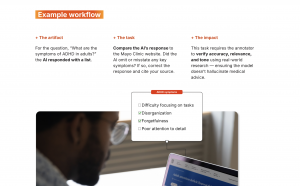Sigma AI Defines New Standards for Quality Annotation in Generative AI
As enterprises face increased risk from AI hallucination and misinformation, Sigma Truth evolves benchmarks beyond accuracy
Quality in generative AI isn’t binary, and it isn’t simple. You need human judgment to teach machines to reason with nuance, handle ambiguity, and synthesize across sources.”
MIAMI, FL, UNITED STATES, September 30, 2025 /EINPresswire.com/ -- Sigma AI, The Human Context Company and a global leader in human‑in‑the‑loop data annotation, today announced new standards for evaluating and improving the quality of generative AI outputs. As enterprises rapidly adopt large language models (LLMs), the company is calling attention to a major industry challenge: the old benchmark of 99.99% accuracy — the gold standard for traditional, binary AI tasks — no longer applies when evaluating open‑ended, generative responses.— Daniel Tapias, CEO of Sigma AI
Unlike traditional AI systems, which could be measured by simple right‑or‑wrong outputs, LLMs generate nuanced, contextual responses that demand far more than surface‑level accuracy. “Truth” in generative AI requires evaluating factual grounding, coherence, attribution, tone, and context, criteria that legacy accuracy metrics often fail to capture. According to Gartner, “By 2027, 45% of organizations worldwide will experience a generative AI data quality issue leading to visible errors in decision‑making or customer experience.”
These stakes are driving companies to seek new, human‑centered approaches to validating and training their models. “Quality in generative AI isn’t binary, and it isn’t simple,” said Daniel Tapias, CEO of Sigma AI. “It’s about teaching machines to reason with nuance. Accuracy alone is not enough when AI must respond to open‑ended questions, handle ambiguity, and synthesize across sources. You need human judgment layered in. That’s why we built Sigma Truth: to help enterprises deliver outputs that are not just technically correct, but contextually trustworthy.”
Sigma Truth offers workflows such as ground‑truth validation, factuality scoring, attribution checks, and iterative multi‑pass reviews. Trained annotators and subject matter experts evaluate AI outputs against trusted references, flag hallucinations, and rewrite responses when needed, creating a feedback loop that aligns LLMs with real‑world expectations.
Through live calibration, inter‑annotator agreement benchmarks, and continuous refinement, Sigma helps clients create trustworthy AI systems. Organizations from healthcare, financial services, and enterprise software are already adopting these new quality standards to reduce risk, avoid misinformation, and unlock more value from their AI investments.
GET THE FREE WHITEPAPER ON QUALITY GEN AI STANDARDS
To learn more about Sigma’s new quality standards for generative AI, download the whitepaper outlining the 10 new quality markers for data annotation in generative AI.
ABOUT SIGMA AI
Sigma AI is The Human Context Company for generative and agentic AI. With 30+ years of AI industry experience, we partner with enterprises worldwide to elevate the quality of large language models (LLMs) through advanced data annotation and human‑in‑the‑loop services. Our teams deliver nuanced, domain‑expert reviews across more than 700 languages and dialects, capturing tone, intent, and meaning that machines alone miss.
With proprietary workflows, rigorous inter‑annotator standards, and global scale, we enable organizations to train smarter models that deliver trustworthy outputs in high‑stakes and high-security applications. We are committed to ethically accelerating next-generation AI with operations in North America, Europe, and annotators in 100+ countries.
Heidi Tretheway
Sigma AI Group LLC
email us here
Visit us on social media:
LinkedIn
YouTube
About Sigma AI human data annotation services
Legal Disclaimer:
EIN Presswire provides this news content "as is" without warranty of any kind. We do not accept any responsibility or liability for the accuracy, content, images, videos, licenses, completeness, legality, or reliability of the information contained in this article. If you have any complaints or copyright issues related to this article, kindly contact the author above.



